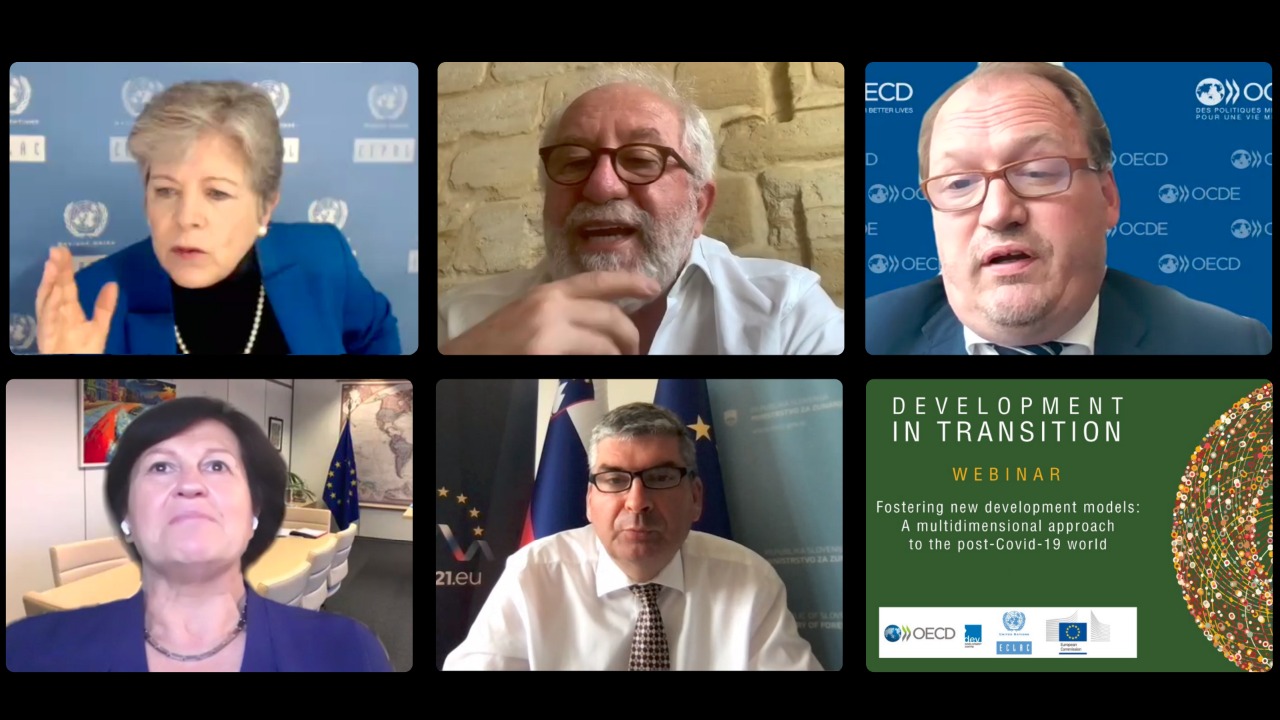It is Urgent that the International Community Support the End of Middle-Income Countries’ Graduation from Official Development Assistance
Alicia Bárcena, ECLAC’s Executive Secretary, participated today in the opening session of a month-long event entitled Development in Transition: Dialogues to chart new paths for Latin America and the Caribbean, where she called for adopting a multidimensional measure of development.

The Executive Secretary of the Economic Commission for Latin America and the Caribbean (ECLAC), Alicia Bárcena, urged the international community to support the end of middle-income countries’ graduation from Official Development Assistance (ODA), during today’s opening segment of a month-long series entitled Development in Transition: Dialogues to chart new paths for Latin America and the Caribbean, organized by ECLAC, the European Commission and the Development Centre of the Organisation for Economic Co-operation and Development (OECD).
The senior United Nations official stressed that it is necessary to adopt a multidimensional measure of development and ensure middle-income countries’ access to concessional finance.
“That is why we have been working since 2017 on a change in the narrative, on the concept of Development in Transition,” she indicated.
The opening event of the series of dialogues, entitled Fostering new development models: A multidimensional approach to the post-COVID-19 world, was inaugurated by Andrés Allamand, Minister of Foreign Affairs of Chile; María del Pilar Garrido, Minister of Planning and Economic Policy of Costa Rica; Carola Beatriz Ramón, Undersecretary of Multilateral and Bilateral Economic Affairs of Argentina; and Francisco André, Secretary of State for Foreign Affairs and Cooperation of Portugal (by video).
Participating in the panel discussion along with Alicia Bárcena were Mario Pezzini, Director of the OECD Development Centre; Andreas Schaal, Director of the Global Relations Secretariat of the OECD; and Jolita Butkeviciene, Director for Latin America and the Caribbean of the European Commission. The event’s closing remarks were delivered by Stanislav Raščan, State Secretary at the Ministry of Foreign Affairs of Slovenia.
In her remarks, Alicia Bárcena warned that the world is currently facing the deepening of global asymmetries and a divergent recovery, with unequal access to vaccines, markets, financing and technological capabilities.
“Developing countries are being left behind, far from achieving the Sustainable Development Goals,” she affirmed.
She reiterated that Latin America and the Caribbean is the region in the developing world that has been hardest hit by the pandemic, with 203 million poor people, 78 million people living in extreme poverty, and 42 million unemployed, with women being the most affected.
The region is also the most highly indebted in the developing world and has to pay the equivalent of 59% of its exports to service its debt, ECLAC’s Executive Secretary warned.
“We have to rethink the development paradigm. We need an unconventional response that would enable a resilient, decarbonized and digitized transformation,” she underscored.
Alicia Bárcena said it is necessary to tackle low productivity and achieve authentic competitiveness in Latin America and the Caribbean, but external constraints must be addressed in order to do so.
“The region is growing again due to commodity prices, but this poses the risk of reprimarization, it does not create employment and it takes us back to the old extractivist paradigm,” she sustained.
She called on the developed world to give space to countries in transition and to less developed countries to build technological and industrial capacities, adding that the pandemic is an opportunity to increase capabilities, for example, in the region’s pharmaceutical industry.
ECLAC’s highest authority also stated that it is necessary to address social inclusion and income redistribution, while moving towards a fiscal paradigm shift.
In addition, she urged for more investment. “Latin America and the Caribbean invests 18% of GDP and at least 10 percentage points more are needed. These investments must be geared towards a green transition, towards sectors that truly enable decarbonization,” she said.
Finally, she stressed the urgency of a global compact for a more just multilateralism.
“We need to include middle-income countries in the G20 debt standstill initiative, to incorporate innovative instruments such as hurricane clauses, SDG bonds and others, to analyze the role of rating agencies and hopefully a multilateral debt forum, where we could discuss a public rating agency. And, certainly, greater additional redistribution of liquidity, beyond the Special Drawing Rights (SDRs),” Alicia Bárcena emphasized.
“We have said this many times: we believe the graduation process should be suspended, retaining Official Development Assistance. We need a multidimensional approach and different measures, access to concessional finance by middle-income countries, and for the multilateral trading system to be friendlier to middle-income countries,” she concluded.
Type
Country(ies)
- Latin America and the Caribbean